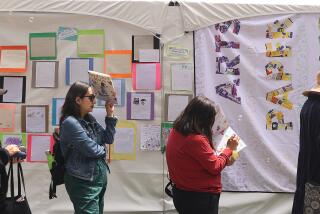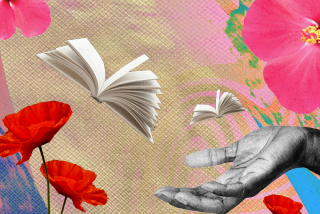Eloise Klein Healy, L.A.’s first poet laureate
It’s a match made in heaven — or heav’n, as a poet might write. Eloise Klein Healy and the city of Los Angeles share a birthday, Sept. 4, and now, for a couple of years, they’ll officially share a future. Healy has been named the city’s first poet laureate, tasked with writing for big occasions and with making poetry a public matter. She’s a Valley gal, to wit, Sherman Oaks, with her partner, Colleen Rooney, and their Portuguese water dog, Nikita. The founder of the MFA program at Antioch University, she has foraged deeply for poetic material in the city’s weave of cultures and freeways. Her next collection, “A Wild Surmise,” comes out in March.
What do you want to do as poet laureate?
“Go out into the highways and the hedges.”
There are no guidelines about this position; it’s totally new. There are things I’d like to try that I’d probably have to raise money for or use my big salary. I’ve gone to schools where they have no books in the classroom, and I’ve brought books and the students get to keep one. Maybe I can get some presses to give me some books to take along.
I’m going to meet lots of people who are going say, “Oh, I always wanted to write.” Maybe that’s the first time they even vocalized it.
I want to hunt for poems in Vietnamese or Spanish or Farsi. It’d be nice to have [poetry] posters in the buses but in two languages which aren’t English: Spanish and Chinese, or Russian and Armenian.
About that “big salary” — $10,000 a year for two years, from the Cultural Affairs Department budget. Some people will say that the city’s in terrible shape, this is what they’re spending money on?
The city’s in terrible shape with its literary reputation too. People in New York support the business end of literary culture — presses and literary magazines. That’s a problem [in L.A.]. The mayor’s saying we’re the kind of city who should have something like this. That’s what the job’s about. It’s not about who’s the best poet. It’s about, can somebody speak to literary culture?
We take ourselves seriously in entertainment, we take ourselves seriously as a port city, but we don’t take ourselves seriously as a literary city. It’s time to step up and say this is a world-class literary city.
When did you come to L.A.?
I was 10 1/2 and that was 1954. My parents came here on vacation. My father had always been interested in leaving Iowa. He was not interested in farm life. Carmen was my mother — her mother loved the opera “Carmen” so much she named her first child Carmen, in the middle of South Dakota! I moved from a small community as a small person and grew up in a really big place.
I feel my parents were immigrants. They came here because they felt it’s not happening for us in Iowa. I understand immigrant children who come from other places to be part of a big enterprise their family’s involved in, making a new life that’s different from what the rest of your family did.
What makes somebody an Angeleno?
I don’t know that there is one kind. When I was teaching at Cal State Northridge, I’d have students who’d never been out of the Valley. Everything they needed was right there.
For my own self definition, it’s that I live in a place that’s a small country, and I can go to all different kinds of places in my country and find different people, different landscapes, different architecture. I don’t think there’s any other city in the United States that I’d live.
How did you discover poetry?
When my father went off to war, [our] entertainment was [my mother] reading to me. I fell in love with “A Child’s Garden of Verses.” I was a voracious reader. I didn’t really write until I was in high school, when I had the traditional experience of some teacher saying to me, “This was really great, you should do more writing.”
I think it was all based on reading and in some way standing in front of a juke box or listening to live music; I learned a lot about rhythm from listening to music like that.
Make the case for poetry for people who say it’s a frill.
That is kind of a stupid attitude, and it’s not the attitude that’s held worldwide. I went to the Shanghai art institute and guys were making [poetry] scrolls. [One] said, “What does the government do for you?” I looked at him like, are you nuts? I don’t have a government job. I make my own way. He said you should come here, you can live in our [arts] building.
We are way low in support of the arts. It comes from a kind of Puritan suspicion of emotion, and this weird faux capitalism where everybody’s supposed to make their way through the wilderness with an ax and no help from anybody.
Every great civilization has lavished money on the arts. They understood the human appreciation of beauty and expression. We have a harder time selling that unless it also makes a truckload of money.
So what does poetry do for someone who may not even read poetry?
Most people listen to popular songs and that is listening to poetry. They don’t understand that it’s poetry because it’s got music with it.
People can get a little too fancy about what poetry is, and that’s moved ordinary people away from it. [But] look at me. You probably can understand what I’m saying.
Why, in times of emotional stress, do people who may only pick up a pen to write a grocery list turn to poetry?
Go back to old William Wordsworth: the spontaneous overflow of powerful feelings. People get enough emotion going, they’re going to write a poem for their father’s death.
Are these good poems? Does it matter whether they pass muster with “the academy”?
It’s only the academy’s business to deal with writing by a person who says, “I want to be a writer.” Think of people who go out every weekend on soccer fields and basketball courts. It’s not the Galaxy and it’s not the Lakers, but people are having a wonderful time. Sometimes with art or literature, there’s this notion that nobody should be doing it except smart, committed, professional people, and the rest of you shouldn’t bother. Well, that’s silly. It’s a way to keep people away from it.
You’ve written about freeways. That might astonish people who think poetry has to be about pretty stuff.
Those are pretty. It’s another kind of pretty, an urban prettiness. If you look at L.A. from above, those interchanges, they’re like little lace things.
In your next collection, if readers scan some poems with a smartphone, they’ll hear a recording of you reading them. I’ve never seen that before.
People have done it in an educational framework but not any book of poetry. Some people are going to say, “That’s just a gimmick,” and others are going to say, “I like this.”
You’re a Dodgers fan, and you’ve written a Dodgers poem.
A game is like a poem with nine stanzas. Some stanzas are pretty short, some can go on for a long time with dramatic results. There’s a looping rhythm to the game, and then the explosive punctuation in the form of a line-drive home run changes everything. It’s very lyrical, baseball, the fleetness of outfielders, the balletic grace of a double play. I have a poem that sees the move from first to second as “cuneiform of cleats along the path.” The Jumbotron — I would really like to have a little poem put up there every now and then, a baseball poem by L.A. poets. Marianne Moore was a big Yankees fan. She was rabid.
Is there a California writer who influenced you?
This is a strange one: William Saroyan. I read everything he wrote. It was his heart for other people. His character was always seeking a better world.
In college I liked [Lawrence] Ferlinghetti quite a bit. I kind of like to be slapped around a bit by Robinson Jeffers; I was a little bit afraid of him, but then I began to get it and I like him a lot. Diane di Prima; she’s one of the underappreciated authors of the Beat era, but that’s because she was a woman.
Does it matter to you that you’re identified as a lesbian poet, a poet who happens to be lesbian or identified as gay at all?
It has mattered in this respect: I feel like I always wanted to be out. I didn’t want to live a closeted life. Whenever I teach a class, I come out first thing. That’s part of me.
Follow Patt Morrison on Twitter @pattmlatimes
This interview was edited and excerpted from a taped transcript. An archive of Morrison’s interviews can be found at latimes.com/pattasks.
More to Read
A cure for the common opinion
Get thought-provoking perspectives with our weekly newsletter.
You may occasionally receive promotional content from the Los Angeles Times.







